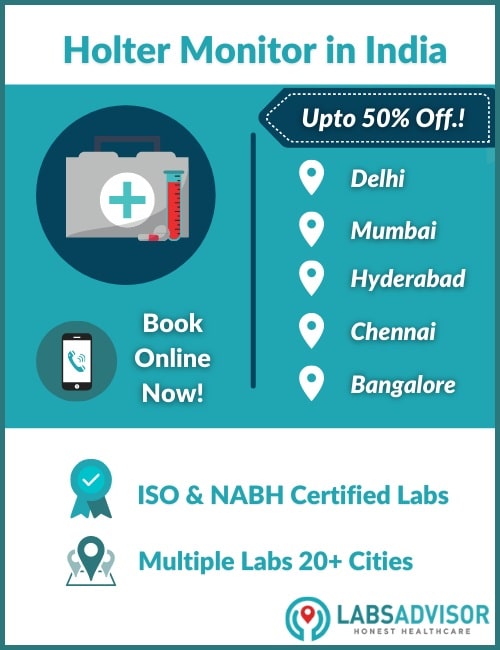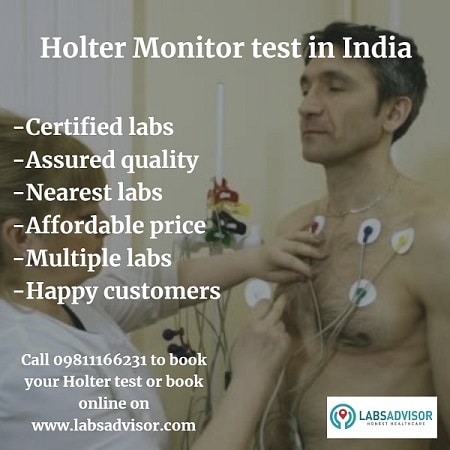
A Holter monitor is a battery-operated device used to record the electrical activity of your heart continuously over a period of 24 to 48 hours.
Book your Holter Monitor test at your local top-quality labs through us at up to 50% discount. The lowest Holter Monitor test cost is ₹1800 only.
Holter Monitor Test in India Through LabsAdvisor
|
Book Holter Monitor online yourself at any time of the day or night by clicking on the appropriate link in the table below
Holter Monitor Test Cost in India and Lab Details
We offer the Holter Monitor test in over 20 Indian cities. Click on the link of your city below to choose a lab and make an online booking for home collection at a suitable time.
| City for Holter Monitor | Price Starting from |
| Holter Monitor Test Price in Mumbai | ₹3600 |
| Holter Monitor Test Price in Noida | ₹1800 |
| Holter Monitor Test Price in Thane | ₹3600 |
| Holter Monitor Test Price in Delhi | ₹2000 |
| Holter Monitor Test Price in Bangalore | ₹6105 |
| Holter Monitor Test Price in Gurgaon | ₹2000 |
| Holter Monitor Test Price in Other Cities | ₹1800 |
If your city is not listed in the table above, call us on +918061970525. We will get back to you with the price of a Holter Monitor test near you.
Get the lowest price for your Holter Monitor test by calling us at
If you want us to call you back, click on the link below
The discounts on the cost of the Holter Monitor test are available only to those who made the booking through LabsAdvisor.com. You will be asked to pay the actual Holter Monitor price if you do not carry the booking confirmation message sent by the LabsAdvisor.com

Frequently Asked Questions About Holter Monitor Test
What is a Holter Monitor?
It is a small portable device, about the size of a small camera, and has two to three electrodes attached.
The sticky patches at the end of the electrodes are stuck to your chest to catch the electric signals from your heart. The Holter monitor has a built-in memory that stores beat-by-beat signals from your heart.
Thus, the Holter device is also called an ambulatory electrocardiography device.
Why do you need a Holter Monitor?
A regular electrocardiogram lets your doctor evaluate your heart condition during the time it is carried out. But abnormal heart rhythm and cardiac symptoms may not be present at that time.
Conditions like arrhythmia of the heart, palpitations, dizziness occur suddenly and subside after some time.
It is difficult to diagnose your heart condition if the standard ECG is not taken during the occurrence of these symptoms.
Hence, doctors advise Holter monitoring to evaluate your heartbeat over an extended time while you do your normal routine activities.
The uses of the Holter Monitor Test
The Holter test is used to:
- Detect arrhythmias of the heart.
- Find reasons for dizziness, fatigue, palpitations, or fainting.
- Detect slow heartbeat rate or fast beat rate.
- Monitor chest pain that does not occur due to exercise,
- Check if the pacemaker on you is working properly.
- Analyze the effectiveness of the medications given to you for heart conditions like cardiac arrhythmia.
- Assess the risk of cardiac events after a heart attack or any other heart condition you are suffering from.
What is the procedure followed in Holter Monitor Testing?
You will be asked to remove the clothes from your upper body in order to stick the electrode patches on your chest. The chest is cleansed with an alcohol solution to ensure a better attachment of the sticky ECG electrodes.
You should inform your doctor in advance if you are allergic to adhesives. Instructions will be given to you, that explains how to use the monitor and how to attach the patches if they fall off.
You will be carrying the Holter monitor in a pouch around your neck or tied to your waist.

Keep a log, in a diary, of all the activities you do while wearing the monitor and also the symptoms you may have felt during the test.
If you feel symptoms like chest pain, shortness of breath, or dizziness; note down the time of occurrence and the activity you are doing at that time. It is very important that you accurately record your symptoms and activities.
The doctor will compare your diary with the ECG recorded by the Holter monitor to assess your heart condition. Once the recommended monitoring period is over, you need to go back to the lab to return the device.
The nurse or technician at the lab will remove the electrodes from your chest. You may feel slight discomfort when the adhesive patch is removed from your chest.
Precautions to be taken while wearing Holter Monitor
You can carry out your usual activities with the following exceptions:
- Do not bathe, swim or shower while wearing the Holter monitor.
- Do not have your x-rays done.
- Stay away from high voltage areas, metal detectors, strong magnets, or microwaves.
- Also avoid the use of electrical appliances such as hair dryers, electric toothbrushes, or electric blankets.
- Keep your cell phones and portable music players at least 6 inches away from you.
- If you exercise, do so at a cool place so that you don’t sweat too much. Sweating may cause the sensors to lose their stickiness and fall off.
Advantages of the Holter Monitor Test
- It is a non-invasive, pain-free test with no hazards involved.
- It can be used on an outpatient basis. You can carry out your normal activities while your heart is being monitored.
- An Advanced Holter monitor can record data for nearly two weeks.
- It takes approximately 10 to 15 minutes to apply the monitor and less than 5 minutes to remove it.
- The Holter monitor records ECG continuously providing an overall picture of the activity of your heart without you putting any extra effort.
How do you get the results of the Holter Monitor?
The recordings on the Holter monitor will be printed and given to you. Book an appointment with your doctor to show him the reports. You need to take your activity diary along with the reports.
The doctor will compare the results and the notes in your diary to assess your heart condition.
Abnormal results may mean cardiac arrhythmias. Changes may mean that your heart is not getting enough oxygen.
The monitor may also detect conduction block, a condition in which the trial impulse is either delayed or does not continue into the ventricles of the heart.
Sometimes your doctor may not be able to diagnose your condition on the basis of Holter monitor readings especially if you didn’t get any symptoms during the test.
The doctor then may recommend an event recorder that can be worn for a longer period of time than the standard Holter monitor. The Event recorder is similar to the Holter monitor but it requires you to push a record button when you feel any symptoms.
Limitations of a Holter Monitor Test
- If a patient does not log in to the symptoms correctly, it becomes difficult to correlate and identify the heart conditions. Abnormalities in the heart rate need to be correlated to the occurrence of the symptoms.
- Holter monitors are more effective on patients who get symptoms almost daily.
- Smoking and certain medications can interfere with the data recorded.
- Sweating may cause the electrodes to fall off from the chest.
- Sometimes, the skin gets inflamed or irritated due to the continuous application of the electrodes.
Other topics you may be interested in:-
- ECG Test Cost in India
- Quadruple Marker Test Cost in India
- Beta HCG Test Cost in India
- Double Marker Test Cost in India
- CT Scan Cost in India






